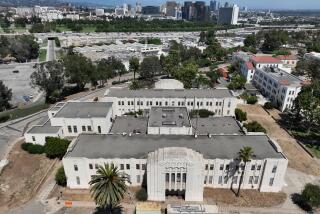Shelter Hands Echo Park a Moral Quandary
- Share via
A 70-year-old building that dominates the main intersection of the bustling Echo Park business district has become the focus of a novel plan to house the chronically mentally disabled.
And the plan has become the focus of an unusually divisive debate in this historically liberal community.
A group called the Los Angeles Men’s Place, or LAMP, intends to operate the building as a long-term sheltered hotel for mentally ill men and women who have gone through more intensive psychiatric programs. The cost of the operation would be subsidized with rents from businesses operated on the ground floor.
Some community activists avidly support the plan as an innovative response to the problem of homelessness. But opposition is growing, especially among business owners on the block who fear that mentally ill residents will create problems on one of the city’s busiest walking intersections.
“It will be really a big problem for the area,” said Jose Del Omo, owner of La Economica department store next door to the building on Sunset Boulevard, near Echo Park Avenue. “I am not against the program, but I am against the program right here.”
Leaders of LAMP said they expect to begin work as early as March, when they are scheduled to take possession of the building. They said they do not need any zoning variances because the building has always been used for single-occupancy rentals.
LAMP, a private charitable organization that operates a downtown drop-in center for the homeless mentally disabled, is buying and renovating the three-story building with more than $2 million in government and private loans, said its director, Mollie Lowery. About $1 million of that will be for the purchase. The group intends to restore much of its pre-1920s grace, she said.
The group would then rent out its upper two floors as long-term housing for a maximum of 33 graduates of its downtown facilities.
Lowery said LAMP will combine rents from the three businesses occupying the ground floor and from the upstairs tenants to operate the building as a self-sustaining hotel without further government subsidy.
The residents, stabilized with medication, would be under the supervision of a resident manager, a full-time counselor and a part-time psychiatrist, Lowery said.
LAMP is also attempting to establish a second downtown project, called The Village, as part of a three-step cycle for rehabilitating the mentally ill. After being stabilized in the drop-in center, clients would progress to The Village, which LAMP hopes to build in a city-owned warehouse on the east side of downtown. There they would live and gain job experience with LAMP’s in-house industries.
In the final stage, they would graduate to long-term living in LAMP’s hotel.
The Village project also ran into opposition from the Central City East Assn., but has been approved by the City Council, Lowery said.
Lowery said the residential program in Echo Park would solve one of the most damaging problems of the mentally ill by providing a client with a stable home life to return to after episodes of illness.
“He can be on a hospital pass and then he can come back again,” she said.
After searching the city for a suitable building, LAMP opened escrow late last year to buy the Echo Park building from a group of investors who had purchased it with the idea of developing law offices in its long-vacant upstairs living quarters.
That plan failed, said LAMP consultant Paul Zimmerman, because the group could not meet the expense of strict city parking regulations for commercial use. The building was also cited for fire and seismic deficiencies, Zimmerman said.
“The place was on its way to condemnation,” he said.
LAMP is financing the project with a package of loans including $300,000 from the Los Angeles Community Redevelopment Agency, $442,000 from the state Department of Housing and Community Development, $100,000 from a federal business tax credit program, and an $800,000 commercial bank loan.
As a requirement of its loan from the redevelopment agency, LAMP is setting up a community oversight committee consisting of merchants, homeowners and city officials.
“The committee would start to meet immediately, as construction began, and would be the voice of the community,” said Susan Cloke, deputy to Councilwoman Gloria Molina.
Molina required the committee as a condition of her support so that, “if there were problems, there would be a built-in system for solving those problems,” Cloke said.
Credentials Investigated
Cloke said Molina’s office researched LAMP’s background and concluded that the organization would screen residents carefully and that the hotel “wouldn’t be a drop-in facility where men would be loitering around the streets and just making people feel uncomfortable.”
Before setting up the committee, Lowery had begun contacting activists in Echo Park. She had gained support from Jacques Chambers, president of the Echo Park Community Coordinating Council, and Karen Jaeger, a homeowner leader in nearby Angelino Heights.
Last week, however, as word of the project spread throughout the community, several homeowners and business leaders reacted angrily.
Paul Moore, an unsuccessful candidate in last year’s 1st District council election won by Molina, said he thinks the project is an attempt by the redevelopment agency to export a homeless problem from Skid Row. Moore said he thinks the introduction of the residents could upset the fragile efforts of business leaders to revitalize the community’s business district, which has its fair share of social problems.
‘Already Strained’
“We do have homeless,” Moore said. “We do have mentally ill. We do have derelicts. We are already strained. I would like to see us use our resources to treat the problem we have already.”
Lowery and LAMP’s consultant, Zimmerman, took the criticisms in stride.
They said they believe residents and merchants will soon realize that LAMP must make its program an asset to the community because it depends on rents from healthy businesses.
“It would be suicidal for LAMP not to do everything to make this a prosperous business community,” Zimmerman said.
More to Read
Sign up for Essential California
The most important California stories and recommendations in your inbox every morning.
You may occasionally receive promotional content from the Los Angeles Times.











